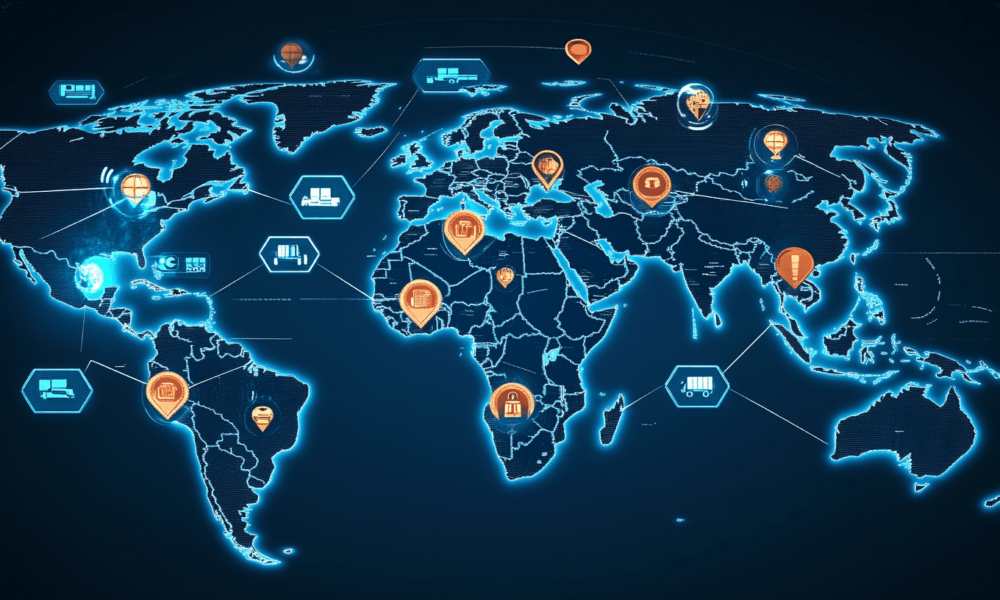Global Recession Looms: Key Factors Behind the World Bank’s Warning
The World Bank has recently issued a stark warning about the growing risk of a global recession, highlighting the potential economic fallout for nations worldwide. As the world grapples with multiple crises, from geopolitical conflicts to high inflation rates and rising interest rates, the economic outlook appears increasingly uncertain. In this article, we delve into the factors contributing to the global recession risk, the World Bank’s assessment, and the possible implications for different sectors of the economy.
Understanding the World Bank’s Warning
The World Bank, a vital international financial institution that provides financial assistance and guidance to developing countries, has painted a grim picture for the global economy. In its latest report, the World Bank outlined several factors that are increasing the risk of a global recession, including high inflation, tightening monetary policy, supply chain disruptions, and geopolitical tensions. According to the World Bank, the combination of these factors could lead to a significant slowdown in economic growth and, in the worst-case scenario, a global recession.
Key Drivers of the Recession Risk
The World Bank identifies several key factors driving the risk of a global recession:
- Rising Interest Rates: Central banks around the world have raised interest rates in response to skyrocketing inflation. While these measures are aimed at bringing inflation under control, they also make borrowing more expensive, which can lead to reduced consumer spending and slower economic growth.
- High Inflation: Inflation has reached multi-decade highs in many countries, driven by supply chain issues, rising energy costs, and increased demand for goods and services. High inflation erodes purchasing power and puts a strain on household budgets.
- Geopolitical Tensions: Ongoing geopolitical tensions, such as the Russia-Ukraine conflict, have created uncertainty in the global markets. Sanctions, trade disruptions, and rising energy prices have exacerbated the economic challenges faced by many countries.
- Supply Chain Disruptions: The COVID-19 pandemic severely impacted global supply chains, leading to shortages and higher prices. Although the pandemic has largely subsided, supply chain disruptions persist due to geopolitical conflicts and other factors.
Impact of Global Recession Risk on Economies
A global recession would have widespread consequences for economies, affecting businesses, governments, and individuals alike. Here, we explore the potential impacts on different aspects of the economy, from employment to international trade.
1. Slower Economic Growth
The risk of a global recession is expected to lead to slower economic growth worldwide. Countries that have already been struggling with economic recovery post-pandemic are particularly vulnerable to further downturns.
- Developing Economies: Developing economies are likely to be the hardest hit, as they may face challenges accessing international credit markets and could see reduced foreign investment.
- Advanced Economies: Developed nations, too, will experience slower growth, especially those that are reliant on exports or have significant exposure to volatile financial markets.
- China’s Role: China, being a major player in the global economy, faces its own set of economic challenges, including an ailing real estate sector and strict COVID-19 policies. A slowdown in China could further contribute to global economic uncertainty.
2. Impact on Employment
A global recession could lead to higher unemployment rates as companies respond to reduced consumer demand by cutting costs and laying off workers.
- Job Losses in Key Sectors: Industries that are sensitive to economic cycles, such as manufacturing, construction, and retail, are likely to see significant job losses.
- Increased Income Inequality: Job losses tend to disproportionately affect low-income workers, leading to increased income inequality and putting additional strain on social safety nets.
3. Impact on International Trade
A global recession would have a profound effect on international trade, leading to reduced demand for goods and services and disruptions in global supply chains.
- Decreased Demand for Exports: Countries that rely heavily on exports, such as Germany and China, may see reduced demand for their products as global economic activity slows.
- Trade Barriers: Countries facing economic challenges may resort to trade protectionism, imposing tariffs or export restrictions to protect domestic industries. This could lead to a decline in global trade volumes.
Monetary Policy and the Risk of Recession
The World Bank has pointed to the role of central banks in shaping the current economic outlook. As central banks around the world continue to tighten monetary policy by raising interest rates to combat inflation, there are growing concerns that these actions could inadvertently trigger a global recession.
1. The Role of Central Banks
Central banks, such as the U.S. Federal Reserve, the European Central Bank, and the Bank of England, have implemented aggressive rate hikes in an attempt to bring inflation under control. However, these measures also have a dampening effect on economic activity.
- Higher Borrowing Costs: Higher interest rates lead to increased borrowing costs for businesses and consumers. This can discourage spending and investment, which in turn slows economic growth.
- Risk of Policy Mistakes: There is a risk that central banks may overcorrect, tightening monetary policy too much or too quickly, which could push economies into recession.
2. Balancing Inflation Control with Economic Growth
Central banks face the challenge of balancing the need to control inflation with the risk of stifling economic growth. If inflation is not brought under control, the purchasing power of households could erode further, leading to reduced consumer spending. However, if central banks raise interest rates too aggressively, it could lead to a prolonged period of economic stagnation.
- Stagflation Concerns: There are concerns that the global economy could enter a period of stagflation, characterized by slow economic growth, high unemployment, and persistent inflation. Stagflation is particularly challenging to address, as traditional monetary policy tools may be ineffective in combating both inflation and economic stagnation simultaneously.
Sectors Most Affected by Global Recession Risk
Certain sectors of the economy are more vulnerable to the risks associated with a global recession. Here are some sectors that are likely to be most affected:
1. Manufacturing and Construction
The manufacturing and construction sectors are highly sensitive to changes in economic conditions. During a recession, reduced consumer spending and lower demand for goods often lead to production slowdowns and project delays.
- Supply Chain Challenges: The ongoing supply chain issues, combined with reduced demand, could lead to further disruptions in manufacturing and construction activities.
- Reduced Investment: Companies may also delay or cancel capital expenditures, affecting the construction industry and related businesses.
2. Retail and Consumer Goods
Retailers and consumer goods companies are likely to see reduced demand as households cut back on spending during uncertain economic times.
- Reduced Consumer Spending: High inflation and rising interest rates reduce disposable income, leading consumers to cut back on discretionary spending.
- Shift to Essential Goods: Consumers may prioritize essential goods over luxury items, leading to a shift in demand patterns for retail companies.
3. Financial Services
The financial services sector is also vulnerable to the risk of a global recession, as market volatility and reduced borrowing can lead to lower profitability for banks and financial institutions.
- Loan Defaults: During economic downturns, the risk of loan defaults increases as businesses and households struggle to meet their financial obligations.
- Decline in Investment Activity: Uncertainty and market volatility can lead to reduced investment activity, affecting financial institutions that rely on trading revenues.
Mitigating the Risk of a Global Recession
Governments, central banks, and international institutions like the World Bank are exploring various measures to mitigate the risk of a global recession and minimize its impact.
1. Fiscal Stimulus
Governments can introduce fiscal stimulus measures to boost economic activity during times of economic downturn. This can include increased government spending on infrastructure projects, tax cuts, and direct cash transfers to households.
- Infrastructure Investments: Investing in infrastructure projects can create jobs and stimulate economic activity, helping to offset the negative impacts of a recession.
- Support for Vulnerable Households: Providing financial support to low-income households can help maintain consumer spending and reduce the social impact of a recession.
2. International Cooperation
Global economic challenges require international cooperation to be effectively addressed. Countries can work together to address supply chain issues, stabilize financial markets, and reduce trade barriers.
- Trade Agreements: Maintaining open trade and reducing tariffs can help ensure the continued flow of goods and services, reducing the impact of trade disruptions.
- Coordinated Monetary Policy: Central banks can work together to ensure that monetary policy actions are aligned and do not lead to unintended consequences for other economies.
3. Diversification of Supply Chains
To reduce vulnerability to supply chain disruptions, companies can diversify their supply chains and reduce reliance on a single region or supplier.
- Regional Sourcing: Diversifying suppliers and sourcing materials from multiple regions can help mitigate the risk of supply chain disruptions due to geopolitical tensions or other factors.
- Resilience Planning: Companies can invest in resilience planning to prepare for potential disruptions, ensuring that they can continue operations during times of economic uncertainty.
Conclusion
The World Bank’s warning of a global recession risk serves as a reminder of the challenges facing the global economy. High inflation, rising interest rates, geopolitical tensions, and supply chain disruptions all contribute to an increasingly uncertain economic outlook. While the risk of a global recession is real, there are measures that can be taken to mitigate its impact, from fiscal stimulus and international cooperation to diversification of supply chains.
It is crucial for policymakers, businesses, and individuals to stay informed and adapt to the changing economic environment. By understanding the factors contributing to the recession risk and implementing strategies to mitigate its effects, we can work towards a more resilient global economy.




No Comment! Be the first one.